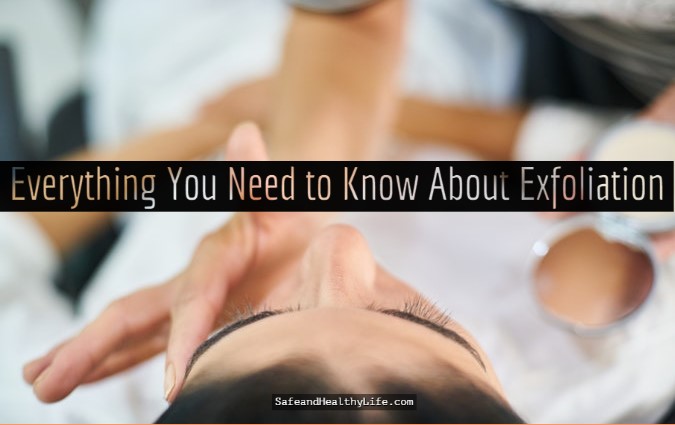
There are multiple ways to achieve that soft and shiny looking skin you want and one of them is exfoliating regularly.
You might be doing everything right – from moisturizing to soaking yourself in sunscreen, but if you fail to exfoliate, it might be not very easy to get that skin you have been dreaming about.
Although it sounds fancy, exfoliation refers to the removal of dead skin cells from your body, lips or face. It can be mechanically by using abrasive scrubs or chemically by using scrubs that contain components like acids that naturally dissolve the dead skin cells, making your skin look fresher and healthier.
In this article, sideeffects.com will answer some of the more popular questions related to do’s and don’ts and other related information about products to look for or avoid.
Why is it important to exfoliate?
As we grow older, the regeneration process of the cell tends to slow down, i.e. the pace at which newer cells are created becomes slower. When this happens, the old skin tends to accumulate on our faces, making it appear dull, dry and lifeless.
When there is an excess of accumulated old skin, there are high chances of the pores on the skin getting clogged leading to skin issues like acne, excessively oily skin and blemishes. Exfoliating regularly can help avoid such skin problems.
The need for exfoliation is to ensure that there is the removal of dead skin cells and uncover the newer cells that lie beneath them. When this is done, it opens up for moisturizing products to be more effective as they can penetrate deeper into the skin.
Therefore, exfoliating will make your skin look brighter, healthier and will help you avoid skin problems.
| Good Read: Do’s and Don’ts for Naturally Beautiful Skin |
Types of exfoliators:
The best kind of exfoliating depends on the sort of skin you have. For people with sensitive skin or with severe acne, it is crucial to be more cautious while choosing an exfoliator.
You can also consult an aesthetician to suggest a suitable exfoliator and the type for exfoliation for effectiveness. The two common different types of exfoliators are:
- Physical exfoliation requires the use of physical objects like brushes, pumice stones, face scrubs with grains, and so on for the removal of dead skin cells. However, one must be wary while using physical exfoliators. After all, they tend to cause damage to your skin because their abrasive nature may create microscopic tears on your skin that might harm your skin barrier. However, these exfoliators can be used on parts of the body that have thick skin like your back, foot, etc. and it is advisable to avoid using them on your face, especially if you have sensitive or acne-prone skin.
- Chemical exfoliators use gentle acids to remove the glue that holds the dead cells by dissolving them. It is considered to be more effective for sensitive parts of the body like the face and lips as they are gentler compared to physical exfoliators. Chemical exfoliators are further divided into two types:
A. Alpha hydroxy acids (AHA) – Exfoliators are containing this acid are most suitable for healthy and dry skin or skin prone to redness. AHA is soluble in water, which means that they remove the glue between the dead cells while ensuring that your skin is still hydrated. It comes in various forms like lactic, mandelic, tartaric and glycolic acid and can be chosen according to your skin type. For sensitive skin, lactic acid-based exfoliators are recommended. These exfoliators can be used a week thrice and must be applied and left on your skin before applying the rest of your skincare products.
B. Beta hydroxy acids (BHA) – These exfoliators are most suitable for those with oily or acne-prone skin. BHA is oil-soluble, therefore, the Hep in breaking down oily pores to get rid of zits, blackheads, and whiteheads.
There is only one type of BHA called salicylic acid, which has popularly been used for the treatment of acne spots. The same process is done while using AHA can be followed for BHA exfoliators as well.
How often to exfoliate:
Exfoliation must be treated as a continuous process as dead skin cells accumulate every day. For people with susceptible skin, it is advisable to start with lactic acid exfoliators and use them only once a week for a few weeks before using it three or four times per week.
However, if there are no visible changes after using lactic acid exfoliators, it is advisable to switch to glycolic or salicylic acid exfoliators. Initially, they can be used thrice in a week before using it regularly every night.
You should always apply a moisturizer after using an exfoliator, no matter what kind.
Some benefits of exfoliating regularly:
- Effectiveness of other skincare products – Regular exfoliation helps other skincare products like moisturizers, serums, and sunscreens penetrate deeper into the skin and work more effectively. When dead skin accumulates on your skin, it blocks the other skincare products from doing their job and rendering them useless.
- Even skin tone – When there is an accumulation of dead cells, it makes the skin appear dull and lifeless. Added to that are the multiple skin problems caused by the oil clogged in the pores of the skin. These issues also make the skin appear pigmented and using exfoliators not only helps to avoid these problems but also makes the skin look even over continuous usage. Check out our good post on “Lighten Up Your Skin Tone“.
- Better circulation and lymphatic drainage – Exfoliation has not only external but also internal benefits. It helps in the drainage of the lymphatic fluids, which facilitates internal cleansing. It helps in detoxifying the skin and helps in the removal of toxins. Exfoliating also helps in the circulation of oxygen-rich blood which can nourish the surface of the skin. Better circulation enables the skin to look more radiant and glowing.
- Prevent ingrown hair – If you wax regularly, the hair that grows back usually tends to be weaker. But there might be situations when there is a red spot around the hair which is caused by ingrown hair that is not able to pierce through the skin. Regular exfoliation will ensure that the dead skin around these spots are removed, helping the hair break through the skin.
- Stimulates collagen synthesis – Regular exfoliating can help in collagen synthesis, which significantly improves the texture of the skin, making it plumper and firmer. It suggests that exfoliating offers a lot of anti-aging benefits and lessens the number of fine lines and wrinkles.
Conclusion
It is evident that exfoliating is an essential part of the daily skincare routine and not only makes the skin look fresher and healthier but can also increase the effectiveness of the other skincare products.
There are inherent benefits of exfoliation as well, so making it a regular part of your skincare routine may help in achieving that flawless skin you have been dreaming about!
However, it is advisable to choose the right kind of exfoliator for depending on the type of skin you have so that it does it harm or irritate your skin.
About The Author:
My name is Helen Scholz and I am a professional nurse turned writer. I share ideas and tips that can be beneficial for my readers.




